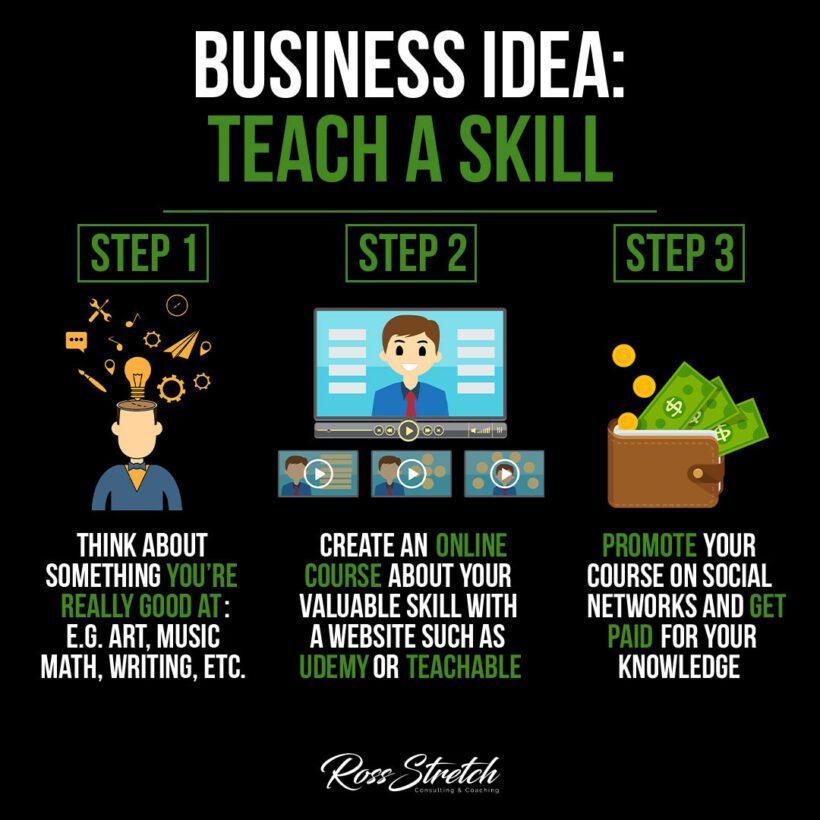Teaching a skill online has become one of the most effective ways to share knowledge and earn an income. Whether you’re skilled in art, music, writing, math, or any other area, you can transform your expertise into a profitable business. Here’s a step-by-step guide to help you get started with teaching your skill online and reaching a global audience.
Step 1: Think About Something You’re Really Good At
The first step in creating a successful online course is to identify a skill or area of expertise you excel in. Consider topics you are passionate about and have substantial knowledge in, as well as those in demand. Here are some areas that are popular for online courses:
- Art & Design: Drawing, painting, graphic design, photography, etc.
- Music: Playing an instrument, music theory, singing, and more.
- Writing & Communication: Copywriting, content creation, public speaking, etc.
- Math & Science: Tutoring for various levels, exam preparation, coding, etc.
Take some time to explore your strengths and research the needs of your target audience. You can use platforms like Quora, Reddit, or Google Trends to find out what people are interested in learning.
- Tips for Choosing a Skill: Consider what problems people want to solve or skills they want to develop. For example, many people are interested in learning digital marketing, personal finance, or personal development skills.
Step 2: Create an Online Course with Platforms like Udemy or Teachable
Once you’ve identified your skill, it’s time to create a structured course. Online course platforms like Udemy and Teachable make it easy to build, host, and sell your course. Here’s how to get started:
- Choose Your Course Format: Decide on the structure of your course. Most courses include video lectures, written materials, quizzes, and exercises. Video is highly engaging, but if you’re camera-shy, you can create slideshows with voiceovers or use screen recordings.
- Outline Your Course Content: Break down your skill into manageable lessons. Start with introductory topics, build up to more complex concepts, and include actionable steps.
- Create High-Quality Content: Invest in a good microphone and camera, or use screen recording software like Camtasia or OBS Studio for a professional feel. Make sure your content is clear, engaging, and easy to follow.Platforms to Consider:
- Udemy: Ideal for reaching a large audience with pre-existing traffic. Udemy helps promote courses to millions of users but takes a portion of the sales.
- Teachable: Offers more control over pricing and marketing. Teachable allows you to host your course on a custom domain and provides more in-depth analytics.
- Earnings Potential: Earnings can vary greatly depending on your course’s niche, pricing, and promotion efforts. Top instructors can make $1,000 to $50,000 per month on platforms like Udemy.
Step 3: Promote Your Course and Get Paid for Your Knowledge
Creating a course is just the beginning. To generate sales, you’ll need to promote it effectively. Here are some proven strategies to help you reach a wider audience and boost your income:
- Use Social Media Platforms: Leverage Instagram, Facebook, LinkedIn, and Twitter to reach potential students. Share valuable tips related to your course content, create engaging posts, and use relevant hashtags to reach a targeted audience.
- Email Marketing: Build an email list by offering a free resource related to your course topic. Use a platform like Mailchimp or ConvertKit to nurture your audience with valuable content and occasional offers.
- Collaborate with Influencers: Partner with influencers or bloggers in your niche who can help promote your course to their audience. You can offer them a free trial or affiliate partnership.
- Paid Advertising: Use Facebook or Google Ads to promote your course. Set a budget and target your ads based on demographics, interests, and location for the best results.Affiliate Marketing: Consider setting up an affiliate program for your course. Websites like ShareASale or AffiliateWP can help you manage affiliates who promote your course in exchange for a commission on sales.
- Earnings Potential from Promotion: Promoting your course effectively can significantly increase your revenue. Some course creators see a 30% increase in sales by utilizing social media and affiliate partnerships.
Conclusion
Teaching a skill online is an excellent way to monetize your expertise while helping others. By identifying a skill, creating an engaging online course, and promoting it strategically, you can build a profitable online business. With platforms like Udemy and Teachable, and the power of social media, you can share your knowledge with learners around the world.


